一般过去时句型变化最新版本
2025届高考英语语法复习一般过去时知识讲解讲义

高考英语一般过去时知识讲解一、结构和用法在英语学习中,时态的掌握是至关重要的一环。
其中,一般过去时作为描述过去发生的动作或存在的状态的时态,具有其独特的结构和用法。
(一)一般过去时的结构1、肯定形式结构:主语 + 动词过去式 + 其他例句:She went to the park yesterday.她昨天去了公园。
规则动词过去式的构成:一般在动词原形末尾直接加上-ed,如:look looked。
以不发音的字母e结尾的动词,去e再加-ed,如:live lived。
末尾只有一个辅音字母的重读闭音节(辅元辅结构),先双写这个辅音字母,再加-ed,如:stop stopped。
末尾是辅音字母+y结尾的动词,先变y为i,然后再加-ed,如:study studied。
2、否定形式结构1:主语 + was/were + not + 其他(be动词的否定)例句:He wasn't at home this morning.他今天早上没在家。
结构2:主语 + didn't + 动词原形 + 其他(行为动词的否定)例句:I didn't know you like coffee.我之前不知道你喜欢喝咖啡。
3、一般疑问句结构1:Did + 主语 + 动词原形 + 其他?例句:Did you go to Beijing last week? 你们上周去北京了吗?结构2:Was/Were + 主语 + 表语?例句:Were you a student 10 years ago?10年前你是学生吗?4、一般过去时的特殊疑问句的构成结构:疑问词 + did + 主语 + 动词原形 + 其他?例句:What did you do last night?昨天晚上你做了什么?常见的特殊疑问词有:who, what, whose, which, when, where, why, how, how long, how much等。
一般过去时的句子结构

一般过去时的句子结构1、be动词的一般过去时其句型:肯定式:主语+BE动词过去式(was、were)+其他 e.g.I was very happy last night.否定式:主语+BE动词过去式(was、were)+not+其他 e.g.Mike wasn’t at home yesterday. 疑问式:BE动词过去式(was、were)+主语+其他 e.g.Was he a driver three years ago?2、当谓语由实义动词充当(不区分第三人称单数):肯定式:主语+动词过去式+其它 e.g.I played the piano yesterday evening.否定式为:主语+did not+动词原形+其它 e.g.He didn’t go to the cinema last night.疑问式为:Did+主语+动词原形+其它 e.g.Did she teach you English yesterday?一般过去时的句子结构1、be动词的一般过去时其句型:肯定式:主语+BE动词过去式(was、were)+其他 e.g.I was very happy last night.否定式:主语+BE动词过去式(was、were)+not+其他 e.g.Mike wasn’t at home yesterday. 疑问式:BE动词过去式(was、were)+主语+其他 e.g.Was he a driver three years ago?2、当谓语由实义动词充当(不区分第三人称单数):肯定式:主语+动词过去式+其它 e.g.I played the piano yesterday evening.否定式为:主语+did not+动词原形+其它 e.g.He didn’t go to the cinema last night.疑问式为:Did+主语+动词原形+其它 e.g.Did she teach you English yesterday?一般过去时的句子结构1、be动词的一般过去时其句型:肯定式:主语+BE动词过去式(was、were)+其他 e.g.I was very happy last night.否定式:主语+BE动词过去式(was、were)+not+其他 e.g.Mike wasn’t at home yesterday. 疑问式:BE动词过去式(was、were)+主语+其他 e.g.Was he a driver three years ago?2、当谓语由实义动词充当(不区分第三人称单数):肯定式:主语+动词过去式+其它 e.g.I played the piano yesterday evening.否定式为:主语+did not+动词原形+其它 e.g.He didn’t go to the cinema last night.疑问式为:Did+主语+动词原形+其它 e.g.Did she teach you English yesterday?。
一般过去时的四种句型

一般过去时的四种句型
肯定形式:主语+动词过去式+其它。
否定形态:主语+didnt+谓语动词原形+其它。
一般疑问句:Did+主语+谓语动词原形+其它?Was/Were+主语+表语?被动语态:主语+was/were+动词的过去分词。
扩展资料
一般过去时句子结构
1、在表示某个时间里存在的状态的句子,系动词用过式was,were构成。
2、在表示过去某个时间里发生的动作,用动词的'过去式构成。
3、各种句式
(1)一般过去时的肯定陈述句:
主语+动词过去式+宾语或表语。
(2)一般过去时的否定句:
a.主语+didn’t+动词原形+宾语。
(did+not=didn't)
b.主语+wasn’t/weren’t+表语。
(was+not=wasn't,were+not=weren't)
(3)一般过去时的一般疑问句:
a.Did+主语+动词原形+宾语?
b.Was/Were+主语+表语?
(4)一般过去时的特殊疑问句:
a.特殊疑问词+did+主语+动词原形+宾语?
b.特殊疑问词+were/was+表语?
向你推荐的相关文章
相关文章列表
微信扫码分享。
英语一般过去时语法知识点

英语一般过去时语法知识点英语一般过去时(Simple Past Tense)是表示过去某个时间发生或存在的动作或状态的一种时态。
以下是英语一般过去时的语法知识点:1. 句子结构:主语+ 动词过去式+ 其他成分。
2. 动词过去式的构成:- 一般情况下,直接在动词原形后面加-ed。
例如:play →played,watch →watched,want →wanted。
- 以不发音的字母“e”结尾的动词,在加-ed前先去掉“e”。
例如:live →lived,change →changed。
- 以辅音字母+y结尾的动词,将y变为i再加-ed。
例如:study →studied,carry →carried。
- 一些不规则动词的过去式需要记忆,例如:go →went,eat →ate,see →saw,do →did。
3. 动词过去式的否定和疑问形式:- 否定形式:主语+ did not + 动词原形+ 其他成分。
缩写为didn't。
例如:I didn't play tennis yesterday.- 疑问形式:Did + 主语+ 动词原形+ 其他成分例如:Did you watch the movie last night?4. 一般过去时的时间状语:昨天(yesterday)、上个月(last month)、去年(last year)等表示过去某个具体时间的时间状语。
5. 一般过去时的用法:- 表示过去某个具体时间发生的动作或状态。
例如:I went to the beach yesterday.- 表示过去一段时间内发生的动作或状态。
例如:I lived in London for two years.- 表示过去习惯性的动作或状态。
例如:When I was a child, I always played with my friends.以上就是英语一般过去时的语法知识点。
记得多加练习,熟练掌握一般过去时的用法。
超详细一般过去时的全面讲解【附练习与答案】
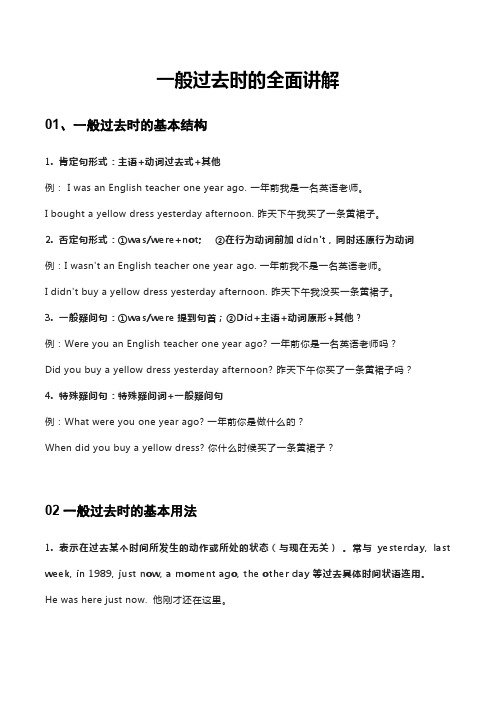
一般过去时的全面讲解01、一般过去时的基本结构1. 肯定句形式:主语+动词过去式+其他例: I was an English teacher one year ago. 一年前我是一名英语老师。
I bought a yellow dress yesterday afternoon. 昨天下午我买了一条黄裙子。
2. 否定句形式:①was/were+not; ②在行为动词前加didn't,同时还原行为动词例:I wasn't an English teacher one year ago. 一年前我不是一名英语老师。
I didn't buy a yellow dress yesterday afternoon. 昨天下午我没买一条黄裙子。
3. 一般疑问句:①was/were提到句首;②Did+主语+动词原形+其他?例:Were you an English teacher one year ago? 一年前你是一名英语老师吗?Did you buy a yellow dress yesterday afternoon? 昨天下午你买了一条黄裙子吗?4. 特殊疑问句:特殊疑问词+一般疑问句例:What were you one year ago? 一年前你是做什么的?When did you buy a yellow dress? 你什么时候买了一条黄裙子?02一般过去时的基本用法1. 表示在过去某个时间所发生的动作或所处的状态(与现在无关)。
常与yesterday, last week, in 1989, just now, a moment ago, the other day等过去具体时间状语连用。
He was here just now. 他刚才还在这里。
What did you do yesterday? 你昨天做了什么事?2. 在过去一段时间内的经常性或习惯性动作。
一般过去时的句子结构
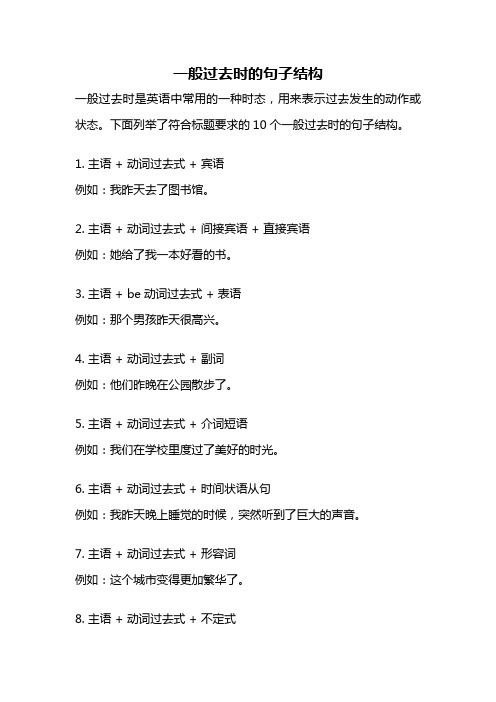
一般过去时的句子结构
一般过去时是英语中常用的一种时态,用来表示过去发生的动作或状态。
下面列举了符合标题要求的10个一般过去时的句子结构。
1. 主语 + 动词过去式 + 宾语
例如:我昨天去了图书馆。
2. 主语 + 动词过去式 + 间接宾语 + 直接宾语
例如:她给了我一本好看的书。
3. 主语 + be动词过去式 + 表语
例如:那个男孩昨天很高兴。
4. 主语 + 动词过去式 + 副词
例如:他们昨晚在公园散步了。
5. 主语 + 动词过去式 + 介词短语
例如:我们在学校里度过了美好的时光。
6. 主语 + 动词过去式 + 时间状语从句
例如:我昨天晚上睡觉的时候,突然听到了巨大的声音。
7. 主语 + 动词过去式 + 形容词
例如:这个城市变得更加繁华了。
8. 主语 + 动词过去式 + 不定式
例如:我昨天决定去看电影。
9. 主语 + 动词过去式 + 状语从句
例如:他听到消息后,感到非常震惊。
10. 主语 + 动词过去式 + 介词短语 + 宾语
例如:我昨天给朋友寄了一封信。
以上是10个符合标题要求的一般过去时的句子结构。
通过这些句子结构,我们可以清楚地表达过去发生的动作或状态。
当我们使用一般过去时时,需要注意动词的过去式形式,并根据需要添加合适的宾语、时间状语、状语从句等,以使句子更加完整和准确。
(完整word版)一般过去时详解(重点)

一、一般过去时的概念:一般过去时用来表示过去某一时间内发生的动作或存在的状态以及过去习惯性、反复性的动作。
谓语动词要用动词的过去式,常和表示过去的时间状语连用,如yesterday昨天、last night昨晚、last week上周、last year去年,等。
二、一般过去时的结构:(可分三类不同的结构)1.Be动词的一般过去时在没有实义动词的句子中使用be动词, am is 的过去式为was; are的过去式为were肯定句式:主语 + be(was , were) + 其它.否定句式:主语 + be(was , were) + not + 其它.一般疑问句:Be(was , were) + 主语 + 其它?注:在这种构成中,be动词有人称和数的变化,即要根据主语选用was / were。
Be动词分为单数和复数,was是表示单数,were是表示复数。
2. 实义动词的一般过去时态肯定句要使用动词的过去式,否定句和疑问句要使用助动词do和 does 的过去式 did.肯定句式:主语 + 动词(过去式)+ 其它否定句式:主语 + didn’t + 动词(原形)+ 其它【did not = didn’t】一般疑问句:Did + 主语+ 动词(原形)+ 其它【do , does的过去时均为did】?注:did和didn’t是构成一般过去时的助动词,其特点是要在其后跟动词的原形。
3. 情态动词的一般过去时态含有情态动词的一般过去时与含有Be动词的一般过去时,是十分相似,请注意观察。
肯定句式:主语 + 情态动词 + 其它.否定句式:主语 + 情态动词 + not + 其它.一般疑问句:情态动词 + 主语 + 其它?注:情态动词的过去式:can→could , may→might , must→must,will-would,should-should.4.特殊疑问句式:特殊疑问词+be过去式+主语+其他?特殊疑问词+情态助动词过去式+主语+动词原形+其他?特殊疑问词+do/does过去式+主语+动词原形+其他?What was your former name?你以前叫什么名字?Why did he late for school last Monday?上星期一他为什么迟到?What could she do twenty years ago?20年前她能做什么?三、一般过去时的判断标志词yesterday , the day before yesterday , last + 时间 , this morning时间 + ago , just now , a moment ago , in + 过去的时间 .四、规则动词的过去式1.一般情况下,在动词原形后面加-ed。
(完整版)一般过去时时用法及例句
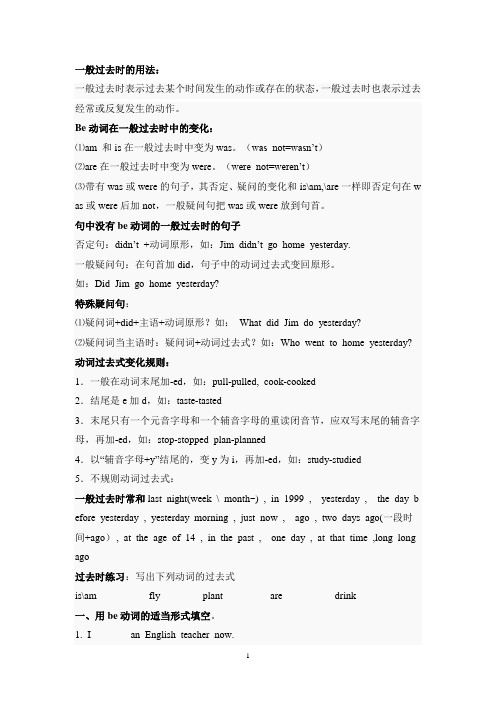
一般过去时的用法:一般过去时表示过去某个时间发生的动作或存在的状态,一般过去时也表示过去经常或反复发生的动作。
Be动词在一般过去时中的变化:⑴am 和is在一般过去时中变为was。
(was not=wasn’t)⑵are在一般过去时中变为were。
(were not=weren’t)⑶带有was或were的句子,其否定、疑问的变化和is\am,\are一样即否定句在w as或were后加not,一般疑问句把was或were放到句首。
句中没有be动词的一般过去时的句子否定句:didn’t +动词原形,如:Jim didn’t go home yesterday.一般疑问句:在句首加did,句子中的动词过去式变回原形。
如:Did Jim go home yesterday?特殊疑问句:⑴疑问词+did+主语+动词原形?如:What did Jim do yesterday?⑵疑问词当主语时:疑问词+动词过去式?如:Who went to home yesterday? 动词过去式变化规则:1.一般在动词末尾加-ed,如:pull-pulled, cook-cooked2.结尾是e加d,如:taste-tasted3.末尾只有一个元音字母和一个辅音字母的重读闭音节,应双写末尾的辅音字母,再加-ed,如:stop-stopped plan-planned4.以“辅音字母+y”结尾的,变y为i,再加-ed,如:study-studied5.不规则动词过去式:一般过去时常和last night(week \ month~) , in 1999 , yesterday , the day b efore yesterday , yesterday morning , just now , ago , two days ago(一段时间+ago), at the age of 14 , in the past , one day , at that time ,long long ago过去时练习:写出下列动词的过去式is\am_________ fly_______ plant________ are ________ drink___一、用be动词的适当形式填空。
六年级一般过去时句型变换
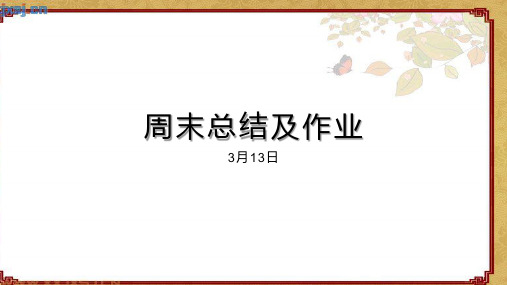
我上周末没看电视。
三、 一般疑问句“Did+主语+动词原形+其他 I watched TV last night.(变为一般疑问句) ----Did you watch TV last night?
肯定回答为 Yes,主语+did,否定回答为“No, 主语+didn't,
如:Yes,I did. / No,I didn't
2、He saw a film yesterday.(变为否定句) He didn't ssaewe a film yesterday
3、I played football this morning. (变为一般疑问句 ,并作肯定回答) Did you I played football this morning ?
周末总结及作业
3月13日
学过的不规则动词过去式
am is--was are--were do--did have has--had
是
是
助动词
有、吃
go--went read--read hurt--hurt can--cound
去
读
弄伤
能
see--saw drink--drank sleep--slept fall--fell
四、特殊疑问句:特殊疑问词+一 般疑问句? What did you do last weekend?
When did you watch TV?
Where did you go last weekend?
How did you go to school?
句型转换
1、Mary does her homework everyday. (用last night改写句子)。 Mary did her homework last night
一般过去时不规则动词变化表
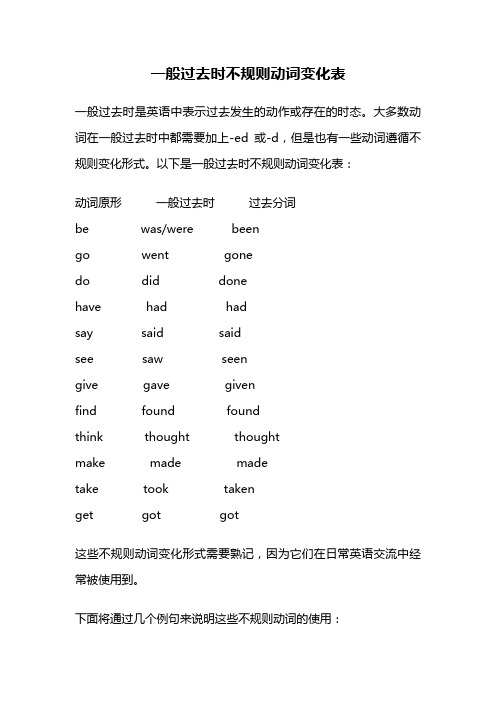
一般过去时不规则动词变化表一般过去时是英语中表示过去发生的动作或存在的时态。
大多数动词在一般过去时中都需要加上-ed或-d,但是也有一些动词遵循不规则变化形式。
以下是一般过去时不规则动词变化表:动词原形一般过去时过去分词be was/were beengo went gonedo did donehave had hadsay said saidsee saw seengive gave givenfind found foundthink thought thoughtmake made madetake took takenget got got这些不规则动词变化形式需要熟记,因为它们在日常英语交流中经常被使用到。
下面将通过几个例句来说明这些不规则动词的使用:1. be动词一般过去时中,be动词有两种形式,根据主语的单复数和人称的不同而变化。
例如:I was at home yesterday.(我昨天在家。
)They were happy to see each other.(他们见到彼此很高兴。
)过去分词形式为been,用于完成时态。
例如:I have been to Japan.(我去过日本。
)2. go动词go的一般过去时形式为went。
例如:She went shopping yesterday.(她昨天去购物。
)过去分词形式为gone,用于完成时态。
例如:He has gone to the park.(他去公园了。
)3. do动词do的一般过去时形式为did。
例如:I did my homework last night.(我昨晚做了作业。
)过去分词形式为done,用于完成时态。
例如:She has done a great job.(她做得很出色。
)4. have动词have的一般过去时形式为had。
例如:He had a good time at the party.(他在派对上玩得很开心。
(完整版)一般过去时态总结
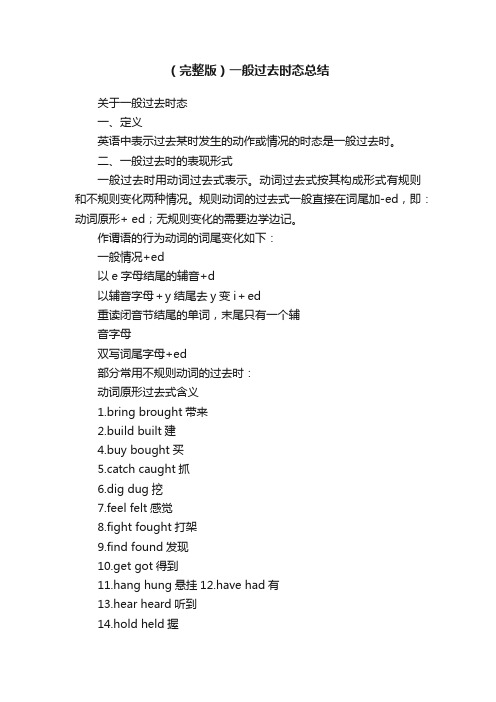
(完整版)一般过去时态总结关于一般过去时态一、定义英语中表示过去某时发生的动作或情况的时态是一般过去时。
二、一般过去时的表现形式一般过去时用动词过去式表示。
动词过去式按其构成形式有规则和不规则变化两种情况。
规则动词的过去式一般直接在词尾加-ed,即:动词原形+ ed;无规则变化的需要边学边记。
作谓语的行为动词的词尾变化如下:一般情况+ed以e字母结尾的辅音+d以辅音字母+y结尾去y变i+ed重读闭音节结尾的单词,末尾只有一个辅音字母双写词尾字母+ed部分常用不规则动词的过去时:动词原形过去式含义1.bring brought带来2.build built建4.buy bought买5.catch caught抓6.dig dug挖7.feel felt感觉8.fight fought打架9.find found发现10.get got得到11.hang hung悬挂12.have had有13.hear heard听到14.hold held握15.keep kept保持17.leave left离开18.lend lent借出19.lose lost丢失20.make made制造22.meet met遇到23.pay paid付款24.say said说25.sell sold卖26.send sent送28.sit sat坐29.sleep slept睡3.spend spent花费32.stand stood站3.sweep swept扫34.teach taught教35.tell told告诉36.think thought想38.win won赢三、一般过去时的几个时间状语yesterday(昨天)、two days ago…(两天前…… )、last year…(去年…)、the other day(前几天)、once upon a time (很久以前)、just now(刚才)、in the old days(过去的日子里)、before liberation(解放前…)、When I was 8 years old(当我八岁时…)、at+一个时间点(注:“过去”的概念并不是只指如“yesterday, last week,…”等,实际上“与现在对立的过去”,亦即“非现在的以前”,哪怕是“过了说话时间的几分钟之前”,只要所要表达的时间与说话时的“现在”形成对立,就必须使用一般过去时来表达。
(完整版)一般过去时句型转换
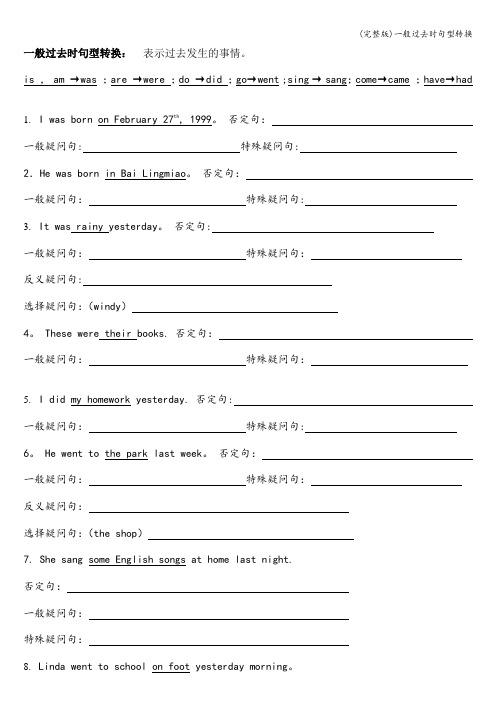
一般过去时句型转换:表示过去发生的事情。
is , am →was ;are →were ;do →did ;go→went ;sing → sang;come→came;have→had1.I was born on February 27th, 1999。
否定句:一般疑问句: 特殊疑问句:2.He was born in Bai Lingmiao。
否定句:一般疑问句:特殊疑问句:3.It was rainy yesterday。
否定句:一般疑问句:特殊疑问句:反义疑问句:选择疑问句:(windy)4。
These were their books. 否定句:一般疑问句:特殊疑问句:5.I did my homework yesterday. 否定句: 一般疑问句:特殊疑问句:6。
He went to the park last week。
否定句:一般疑问句:特殊疑问句:反义疑问句:选择疑问句:(the shop)7. She sang some English songs at home last night.否定句:一般疑问句:特殊疑问句:8.Linda went to school on foot yesterday morning。
否定句:一般疑问句:特殊疑问句:反义疑问句:选择疑问句:(by bike)9.They lived in a big house 10 years ago. 否定句: 一般疑问句:特殊疑问句:10.The twins liked swimming last year. 否定句: 一般疑问句:特殊疑问句:反义疑问句:选择疑问句:(running)11.There used to be lots of flowers in the garden years ago.否定句:一般疑问句:特殊疑问句:。
一般过去时全文

3.一般疑问句:Be动词 / Did+主语+动词原形+其 他?
如:Were you in school last Friday? Did your mother cook dinner last night? Did you wash your clothes last Sunday?
4.特殊疑问句:特殊疑问词+一般疑问句? 如:I was at home yesterday. → Where were you yesterday?
2. 用所给动词的适当形式填空。 (1)Did you _p_l_a_y_ (play) the piano yesterday? (2)I _w_r_o_t_e (write) a letter last night. (3)Who _c_l_e_a_n_e_d_ (clean) the window yesterday? (4)Sarah__ra_n__ (run) to school this morning. (5)Tom _w_e_n_t_ (go) to the park last Sunday.
1. It
(be) Mary's birthday last Friday.
2. We all
(have) a good time last night.
解析:本题考查动词的过去式。1,2小题中的时间词
last Friday 和last night 都2. had
3. meet _m_e_t__ 6. teach _ta_u_g_h_t 9. fly _f_le_w__ 12. drive _d_r_o_v_e 15. tell _t_o_l_d_
二、用括号内所给动词的适当形式填空。 1. Tom and Mary _c_a_m_e_(come) to China last month. 2. Mary _r_e_a_d_(read) English yesterday morning. 3. There _w_e_r_e_(be) no children here ten minutes ago. 4. What __d_id__ you __d_o__ the day before yesterday?(do) 5. Last week wep_i_c_ke_d_(pick) many apples on the farm.
一般过去时句型变化
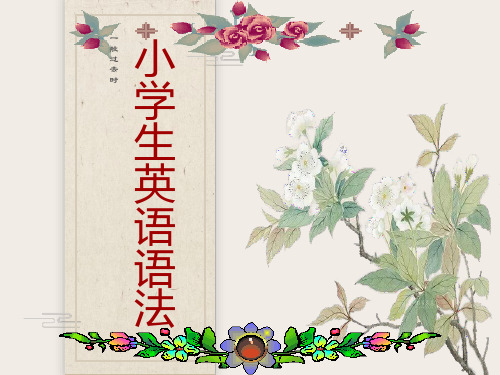
Was/Were+主语 + 其它?
Yes, he was. No, he wasn't.
Yes, they were. No, they weren't.
按要求改写句子
1)Lucy was tired yesterday. 疑问句:______________________________ 肯定回答: . 否定回答:____________________________.
study studied carry carried
look looked play played start started
Were they at the hospital?
Yes, she was.
No, she wasn't.
Yes, they were.
No, they weren't.
否定句:He didn't go to the hospital yesterday.
He went to the hospital yesterday.
否定句:They didn't have a party last Saturday. 含有 行为 动词的句型 表示过去某个时间发生的动作或存在的状态 主语 + did not (didn't)+ 动词原形+其它
They had a party last Saturday.
一般过去时
按要求改写句子
3)末尾只有一个辅音字母的 重读闭音节词,先双写这 个辅音字母,再加—ed
stop stopped plan planned trip tripped
一般过去时句型变化

05
一般过去时与其他时态的辨析
与现在完成时的区别
时间点不同:现在完成时关注现在,一般过去时关注过去
动作状态不同:现在完成时强调动作对现在的影响,一般过去时描述动作的具体发生和结束时 间
语境适用不同:现在完成时强调与现在的联系,一般过去时适用于描述过去的具体事件
与一般现在时的区别
时间点不同:一般过去时表示过去某个时间点发生的事情,而一般现在时表示现在或 目前正在发生的事情。
语境不同:一般过去时常常用于描述过去的事件、经历或者某个时间点的状态,而一 般现在时则常用于描述当前的状态、习惯或者普遍事实。
表达方式不同:一般过去时需要使用助动词“did”或者动词的过去式,而一般现在 时则直接使用动词原形。
语境:过去进行时通常用于描述某个具体的过去时间点,而一般过去时则用于描述过去的某个 时间段。
与过去完成时的区别
定义:过去完成时表示过去的过去,即某个动作在过去的某个时间之前已经完成 结构:过去完成时由助动词had+过去分词构成 用法:过去完成时用于描述过去的某个动作或状态在另一个过去的动作之前已经发生或完成 例子:I had finished my homework before I went to bed last night
用法不同:一般过去时常常与表示过去的时间状语连用,如 “yesterday”、“last year”等,而一般现在时则常与“now”、 “today”等时间状语连用。
感谢观看
汇报人:XX
XX
一般过去时句型变化
单击添加副标题
汇报人:XX
目录
01
一般过去时句型转换(最新整理)

一般过去时句型转换: 表示过去发生的事情。
is , am→was ;are →were ;do →did ;go→went ;sing →sang;come→came ;have→had1.I was born on February 27th, 1999. 否定句:一般疑问句:特殊疑问句:2.He was born in Bai Lingmiao. 否定句:一般疑问句:特殊疑问句:3.It was rainy yesterday. 否定句:一般疑问句:特殊疑问句:反义疑问句:选择疑问句:(windy)4. These were their books. 否定句:一般疑问句:特殊疑问句:5.I did my homework yesterday. 否定句:一般疑问句:特殊疑问句:6. He went to the park last week. 否定句:一般疑问句:特殊疑问句:反义疑问句:选择疑问句:(the shop)7. She sang some English songs at home last night.否定句:一般疑问句:特殊疑问句:8.Linda went to school on foot yesterday morning.否定句:一般疑问句:特殊疑问句:反义疑问句:选择疑问句:(by bike)9.They lived in a big house 10 years ago. 否定句:一般疑问句:特殊疑问句:10.The twins liked swimming last year. 否定句:一般疑问句:特殊疑问句:反义疑问句:选择疑问句:(running)11.There used to be lots of flowers in the garden years ago.否定句:一般疑问句:特殊疑问句:“”“”At the end, Xiao Bian gives you a passage. Minand once said, "people who learn to learn are very happy people.". In every wonderful life, learning is an eternal theme. As a professional clerical and teaching position, I understand the importance of continuous learning, "life is diligent, nothing can be gained", only continuous learning can achieve better self. Only by constantly learning and mastering the latest relevant knowledge, can employees from all walks of life keep up with the pace of enterprise development and innovate to meet the needs of the market. This document is also edited by my studio professionals, there may be errors in the document, if there are errors, please correct, thank you!。
一般过去时的用法及结构

一般过去时的用法及结构第一篇:一般过去时的用法及结构河东实验辅导中心一般过去时的用法及结构1.一般过去时的基本用法一般过去时表示过去某个时间发生的动作或存在的状态,也可表示过去经常或反复发生的动作。
常和表示过去的时间状语连用,如yesterday, last week, last night, in 2003, two days ago等。
【举例】I got up at 6:30 yesterday.我昨天6:30起床。
My father was very busy last week.我父亲上周很忙。
2.一般过去时的基本结构⑴ 肯定句“主语+动词过去式+其他”或者“主语+was/were +其他”。
【举例】I played tennis last weekend.我上周末打网球了。
My school trip was great.我的学校郊游棒极了。
⑵ 否定句“主语+didn’t+动词原形+其他”或“主语+wasn’t/weren’t+其他”。
【举例】The girl didn’t play computer games yesterday afternoon.这个女孩昨天下午没玩电子游戏。
Old Henry wasn’t happy last Friday.上星期五老亨利不高兴。
⑶ 一般疑问句“Did+主语+动词原形+其他?” 肯定回答为“Yes,主语+did”,否定回答为“No,主语+didn’t”或者“Was/Were+主语+其他?” 肯定回答为“Yes,主语+was/were”,否定回答为“No,主语+wasn’t/weren’t”。
【举例】— Did you go to the beach? 你们去海滩了吗?— Yes, we did./No, we didn’t.是的,我们去了。
/不,我们没有。
— Was your weekend OK? 你的周末过得还行吧?— Yes, it was./No, it wasn’t.是的,还行。
- 1、下载文档前请自行甄别文档内容的完整性,平台不提供额外的编辑、内容补充、找答案等附加服务。
- 2、"仅部分预览"的文档,不可在线预览部分如存在完整性等问题,可反馈申请退款(可完整预览的文档不适用该条件!)。
- 3、如文档侵犯您的权益,请联系客服反馈,我们会尽快为您处理(人工客服工作时间:9:00-18:30)。
2. 用动词的适当形式填空
11) They _li_v_e_d__ (live) here two years ago.
12) He _____ (study)English here last year.
13)My fsathuedriepdlayed(play) with me just now. 14) Hes_to__p_p_ed (stop) here a moment ago. 15) Lucy l_o_o_k_e_ (look) at the picture just now.
6)Theyw_e_r_e__(be) here just now.
7)Tom _s_a_w__(see) the nurse yesterday. 8)Lily _d_r_a_n_k(drink) orange juice just now. 9)The doctor _g_a_v__e(give) her some medicine yesterday. 10)Tom a_t_e___(eat) meat ye.sterday afternoon.
按要求改写句子
1)I ate meat just now .
否定句: I didn't eat meat just now .____________
.
2) I had a bad dream.
否定句: I didn't have a bad dream.
.
.
一般过去时
表示过去某个时间发生的动作或存在的状态
2) They were at the hospital.
疑问句: Were they at the hospital?
.
肯定回答: Yes, they were.
.
否定回答:_N_o_, _th_e_y _w_e_re_n_'t._________________.
.
一般过去时
表示过去某个时间发生的动作或存在的状态
.
.
一般过去时
表示过去某个时间发生的动作或存在的状态
含有 be 动词的句型
1. He was a teacher last year. Yes, he was. 疑问句:Was he a teacher last year?No, he wasn't. 2. They were happy just now. Yes, they were. 疑问句:Were they happy now? No, they weren't
2. 用动词的适当形式填空
1) He _w_a__s__ here yesterday. (be)
2) I __g_o_t_ up at 6:00 yesterday morning.(get) 3) My father went often to work by bus last year.(go) 4) I ___w_a_(sbe) ill last Sunday. 5) We _h_a__d_ (have) a party last Saturday.
含有 行为 动词的句型
1. He went to the hospital yesterday. 否定句:He didn't go to the hospital
yesterday. 2. They had a party last Saturday.
否S定a主t句u语r:da+Tyh.deiyddnidont其't(d.h它iadvne'ta)+pa动rty词la原st形+
Was/Were+. 主语 + 其它?
按要求改写句子
1)Lucy was tired yesterday.
疑问句:__W_a_s_L_u_c_y_ti_r_ed__ye_s_te_r_d_ay_?___________
肯定回答: Yes, she was.
.
否定回答:_N_o_,_s_h_e_w_a_s_n'_t._________________.
d
.Hale Waihona Puke 一般过去时表示过去某个时间发生的动作或存在的状态
含有 be 动词的句型
I was a teacher last year. She(He) was a singer. We You were happy. They
.
一般过去时
表示过去某个时间发生的动作或存在的状态
含有 be 动词的句型
1. He was a teacher last year. 否定句:He was not a teacher last year. 2. They were happy just now. 否定句:They were not happy now.
主语 + wasn’t/weren’t + 其 它.
按要求改写句子
1)Lucy was tired yesterday.
否定句: Lucy wasn't tired yesterd__a__y__.______
.
2) You were a doctor last year.
否定句: You weren't a doctor last year.
含有 行为 动词的句型
1. He went to the hospital yesterday. 疑问句:Did he go to the hospital yesterday? 肯定回答:Yes, he did. 否定回答: No,he didn't.
Did+主语 + 动词原形+其它? .
按要求改写句子
1)Tom ate meat just now .
疑问句:__D_id__T_om__e_a_t _m_e_at_j_u_st_n_o_w_?__________
肯定回答: Yes, he did.
.
否定回答:_N_o_,_h_e_d_i_dn_'_t.__________________.
2) Lucy had a bad dream.
疑问句: Did Lucy have a bad dream? 肯定回答:Yes, she did. __________N_o_,_sh_e_d_id_n_'t_. _________.
否定回答:
.
按要求改写句子
1) Lucy did her homework at home yesterday.
